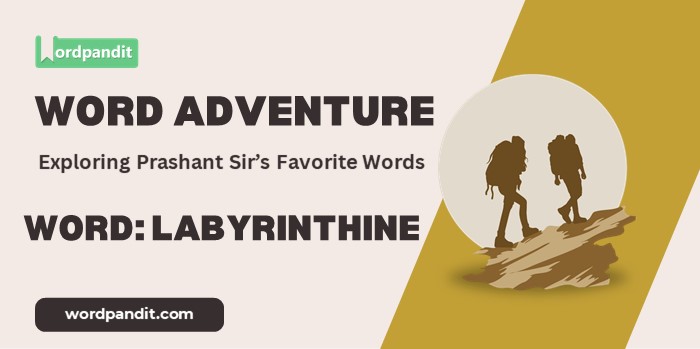Word Adventure: Labyrinthine
The Headline
"Labyrinthine: When Simplicity Takes a Twisted Turn"
The Scoop
In the grand maze of language, some words stand out as particularly winding and complex. 'Labyrinthine' is one such term – a word that embodies the very intricacy it describes. Let's embark on a journey through the twists and turns of this fascinating word, which has roots as deep and tangled as the mythical structure it's named after.
Let's Break It Down
The Plot Thickens
'Labyrinthine' traces its origins to one of the most enduring myths of ancient Greece. The word 'labyrinth' comes from the Greek 'labyrinthos', which referred to the complex maze-like structure built by the legendary craftsman Daedalus for King Minos of Crete. This labyrinth was designed to hold the fearsome Minotaur, a half-man, half-bull creature.
The concept of the labyrinth has fascinated humans for millennia, appearing in various cultures and contexts. From the intricate patterns on ancient coins to the meditative walking paths in medieval cathedrals, labyrinths have symbolized both confusion and enlightenment.
As language evolved, 'labyrinthine' expanded beyond its literal meaning of maze-like structures. Today, it's used to describe anything that is highly intricate or complex, be it a plot in a mystery novel, a bureaucratic process, or even the inner workings of the human mind.
Word in the Wild
The Twist
Here's an intriguing aspect of 'labyrinthine': while we often use it to describe confusing or overly complex situations, labyrinths themselves have a single, non-branching path that leads to the center. Unlike mazes, which are designed to puzzle with dead ends and false paths, true labyrinths are unicursal – they have only one route. This duality in meaning reflects how our perception of complexity doesn't always align with actual intricacy. Sometimes, what seems labyrinthine at first glance may have a clear path – if we just keep following the twists and turns!
Make It Stick
Labyrinthine: When simplicity decides to play an elaborate game of hide and seek!
Your Turn
Think about a time when you encountered something labyrinthine in your life. Was it a complex problem, an intricate piece of art, or perhaps a convoluted situation? How did you navigate through it? Share your labyrinthine experiences in the comments below. Let's explore how we deal with complexity in our daily lives and perhaps find some strategies for unraveling the intricate threads!
Down the Rabbit Hole
- Curious about the original Labyrinth myth? Dive into Greek mythology and the stories of Daedalus, Minos, and Theseus.
- Interested in labyrinths in different cultures? Explore the use of labyrinths in medieval churches or in Native American traditions.
- Want to understand more about complexity? Look into complexity theory in mathematics or the concept of 'wicked problems' in social planning.
The Last Word
As we find our way out of the twisting corridors of our labyrinthine exploration, I hope you've gained a new appreciation for this intricate word. 'Labyrinthine' reminds us that complexity is not always a barrier – sometimes it's an invitation to explore, to persist, and to discover. The next time you face a situation that seems overwhelmingly complex, remember – you're not just dealing with difficulty, you're navigating a labyrinth of possibilities! Until our next word adventure, this is Prashant from Wordpandit, encouraging you to embrace the twists and turns in your linguistic journey, and to find beauty in the complexity of language and life!












